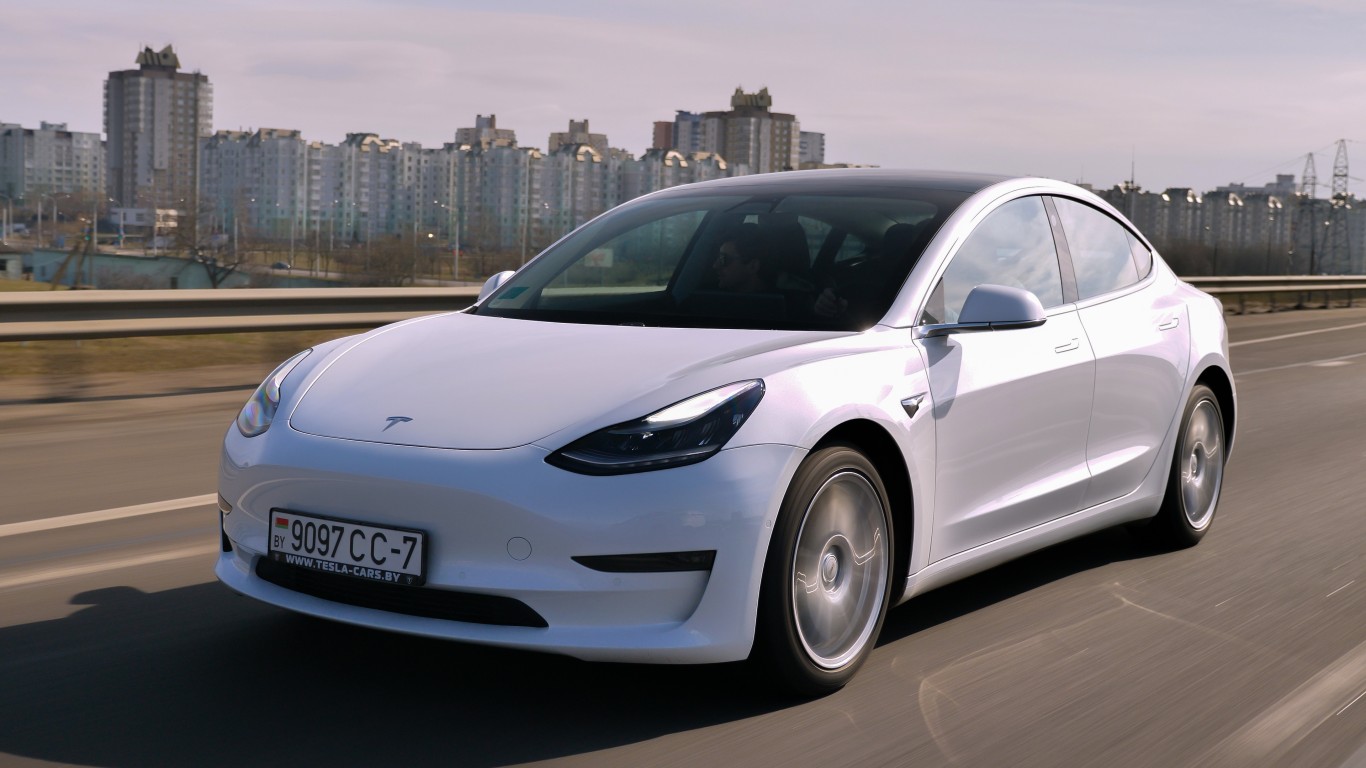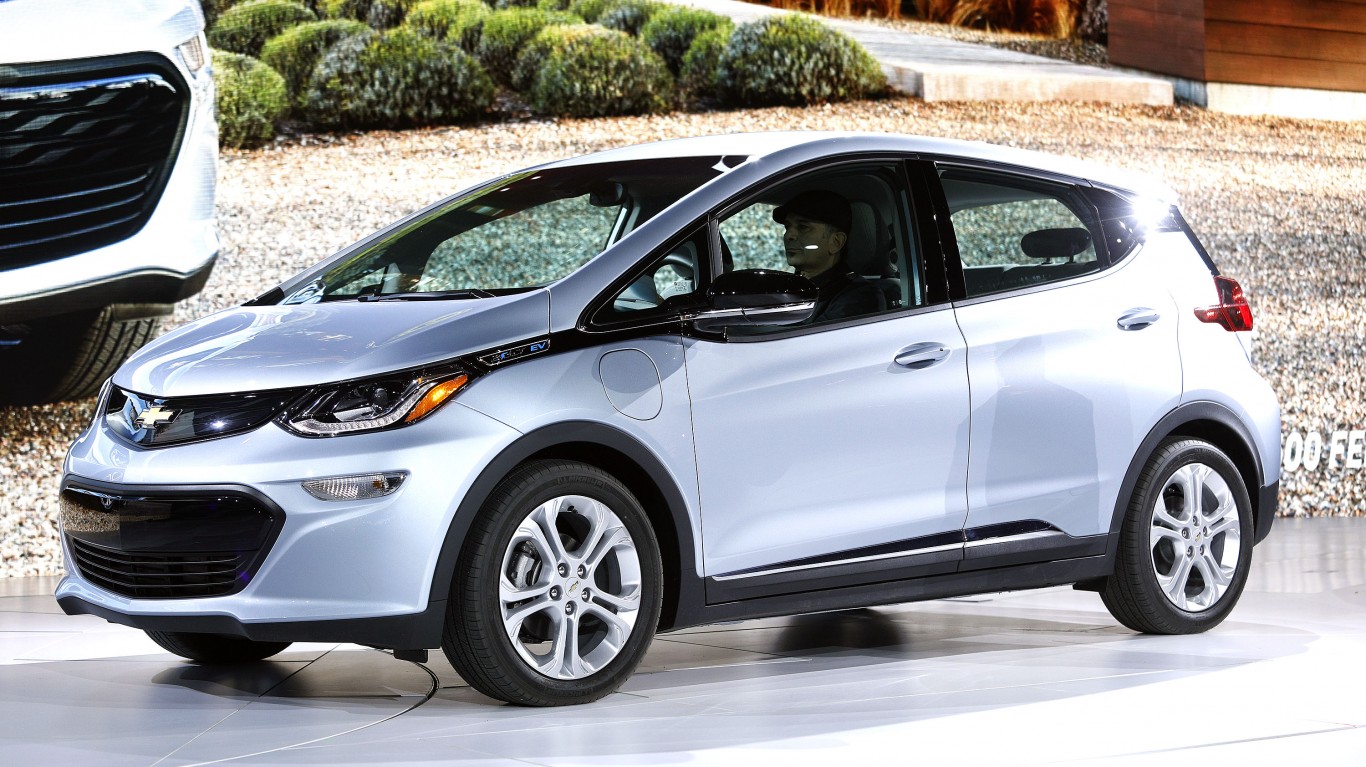
Electric vehicles (EVs) may have yet to fully reach the mainstream, as early adopters continue to toe the line, but they have certainly piqued the interest of consumers, especially with the $7,500 tax credit that comes with owning one. But leasing an EV also makes sense, offering drivers an opportunity to determine if the transition from a combustion engine to an electricity-powered one works for them.
When it comes to EVs, Tesla (Nasdaq: TSLA) sets the standard. While Tesla jockeys for position with China’s BYD as the world’s best-selling EV maker, Elon Musk’s company is the clear leader in the U.S. market.
But if there was any doubt legacy automakers are serious competitors, the tens of billions of dollars combined they’ve earmarked for EV capex should put those to rest. Among them, General Motors (NYSE: GM) is investing $3.5 billion for a new EV battery facility in Indiana, the single-biggest EV commitment in the state’s history.
GM makes the Chevy Bolt, an EV whose mileage range isn’t too far behind that of a Tesla Model 3. While the Chevy Bolt and Tesla Model 3 may seem like they’re on the opposite sides of the spectrum for features like sportiness, technology and speed, it’s not unusual for consumers to evaluate both when embarking on their EV journeys, especially on price.
Leasing EVs has become an increasingly popular option, but you’ll want to know what it will cost you in the end.
Tesla Model 3

- Model: 2024 Tesla Model 3 RWD
- Monthly Payment: $299 per month (excluding taxes and fees)
- Down Payment: $2,999-$4,500
- Cost to Fully Charge the Battery: $7-$24
- Range: 272 miles – 342 miles
If you’re in the market for a Tesla Model 3 RWD, you can snatch one up for a reasonable monthly payment of $299 per month, before fees. Before this promotion, the Tesla Model 3 lease price was closer to $399-$445 per month, based on the applicant. According to reports, Tesla is passing along the $7,500 tax credit to customers across the term of the lease.
This current deal places Tesla’s Model 3 in the more affordable car category and makes it more comparable to Chevy’s EV on price. The cost to fully charge the battery will depend on the state in which you’re charging.
For example, in North Dakota, the cheapest state for electricity, it’ll only set you back $7 to fully charge your Tesla Model 3, which has a smaller battery vs. other Tesla models, using a home charger. But if you’re charging your EV in Connecticut, where electricity prices are more than 75% higher than the national average, it will cost you closer to the higher end of the range at $24.
You’ll also need to plunk down nearly $3,000 as a down payment for a Model 3 on the low side and as much as $4,500, depending on the number of bells and whistles. You can expect the lease term to last for 36 months at 10,000 miles. Considering Tesla sells directly with customers, select the “lease” option when selecting a payment method. Use the payment calculator to choose the appropriate payment method. Tesla becomes your financier throughout the lease term.
Tesla’s Model 3, which will go from zero to 60 MPH in just over four seconds, comes in RWD and long-range AWD, both of which offer attractive miles/kWh ranges. The 18-inch wheel RWD version offers 3.9 miles/kWh, as does the long-range EV. The mileage range tends to vary but on average falls between 272 miles-342 miles.
Tesla leasing is available in many but not all U.S. states. The following seven states do not offer Tesla leasing options: Delaware, Kentucky, Nebraska, New Hampshire, Oklahoma, South Carolina, and Wisconsin.
Something to bear in mind is that Tesla won’t let you purchase the vehicle at the end of the lease, a stipulation that suggests the EV maker expects the Model 3 to increase in value in the next few years. CoPilot Founder Pat Ryan told Forbes it could be because Tesla is looking to equip the Model 3 for the robotaxi. Also, the $299 lease price might not last forever.
Chevy Bolt

- Model Year: 2023
- Monthly Payment: $409 (on average)
- Down Payment: $2,000
- Cost to Fully Charge the Battery: Approximately $22
The Chevy Bolt is a compact EV that’s been around since 2017. The sticker price ranges between $26,500 and $29,700 to buy, but you can lease one for as little as $2,000 down with an average monthly payment of slightly more than $400.
Chevy offers several lease options on its Bolt that determine the monthly payment amount. Lease a Bolt for 36 months at 10,000 miles per year for a payment on the lower end of the range at $402. But if you want 15,000 miles per year at 24 months, it will cost you $503 per month.
While it’s a compact EV, Edmunds touts this car’s “relatively spacious interior” and “excellent value.” On the downside, Edmunds finds the ride quality to be “mediocre” and charging to be “relatively slow.” But for the value conscious consumer, the Chevy Bolt could be a good overall fit.
On a full charge, the Chevy Bolt, which goes from zero to 60 MPH in just under seven seconds, drives for an estimated 259 miles. But it’s been known to make it closer to 280 miles. Something to consider is that EV batteries weaken over time and can lose between 1% and 2% of their range each year. So by the end of your lease, the Chevy Bolt’s range is likely to be lower.
While Chevy Bolt purchases qualify for the $7,500 federal tax credit, leases do not appear to be included (the dealership may hold onto these savings instead.)
Are You Ahead, or Behind on Retirement? (sponsor)
If you’re one of the over 4 Million Americans set to retire this year, you may want to pay attention.
Finding a financial advisor who puts your interest first can be the difference between a rich retirement and barely getting by, and today it’s easier than ever. SmartAsset’s free tool matches you with up to three fiduciary financial advisors that serve your area in minutes. Each advisor has been carefully vetted, and must act in your best interests. Start your search now.
Don’t waste another minute; get started right here and help your retirement dreams become a retirement reality.
Thank you for reading! Have some feedback for us?
Contact the 24/7 Wall St. editorial team.





